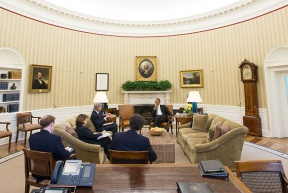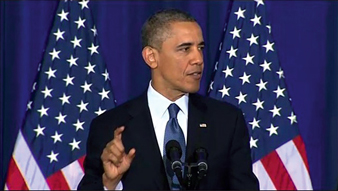JIM.LOBE

WASHINGTON – Responding to growing criticism by human rights groups and foreign governments, U.S. President Barack Obama recently announced potentially significant shifts in what his predecessor called the “global war on terror.”
In a major policy address at the National Defense University here, Mr. Obama said drone strikes against terrorist suspects abroad will be carried out under substantially more limited conditions than during his first term in office.
He also renewed his drive to close the U.S. detention facility at Guantanamo Bay, Cuba, which currently only holds 166 prisoners.
In particular, he announced the lifting of a three-year-old moratorium on repatriating Yemeni detainees to their homeland and the appointment in the near future of senior officials at both the State Department and the Pentagon to expedite the transfer of 30 other prisoners who have been cleared for release to third world countries.
In addition, he said he will press Congress to amend and ultimately repeal its 2001 Authorization to Use Military Force (AUMF) against Al-Qaeda and others deemed responsible for the 9/11 attacks “(in order) to determine how we can continue to fight terrorists without keeping America on a perpetual war-time footing.”
The AUMF created the legal basis for most of the actions–and alleged excesses–by U.S. military and intelligence agencies against alleged terrorists and their supporters since 9/11.

“The AUMF is now nearly 12 years old. The Afghan War is coming to an end. Core Al-Qaeda is a shell of its former self,” he declared. “Groups like AQAP (Al-Qaeda in the Arabian Peninsula) must be dealt with, but in the years to come, not every collection of thugs that labels themselves Al-Qaeda will pose a credible threat to the United States.”
“Unless we discipline our thinking and our actions, we may be drawn into more wars we don’t need to fight, or continue to grant presidents unbound powers more suited for traditional armed conflicts between nation states,” he warned.
His remarks May 23 gained a cautious–if somewhat skeptical and impatient–welcome from some of the groups that have harshly criticized Mr. Obama for his failure to make a more decisive break with some of former President George W. Bush’s policies and to close Guantanamo, and his heavy first-term reliance on drone strikes against Al-Qaeda and other terrorist suspects.
“President Obama is right to say that we cannot be on a war footing forever–but the time to take our country off the global warpath and fully restore the rule of law is now, not at some indeterminate future point,” said Anthony Romero, executive director of the American Civil Liberties Union (ACLU).
Mr. Romero especially praised Mr. Obama’s initial moves to transfer detainees at Guantanamo but noted that he had failed to offer a plan to deal with those prisoners who are considered too dangerous to release but who cannot be tried in U.S. courts for lack of admissible evidence. He also called the new curbs on drone strikes “promising” but criticized Mr. Obama’s continued defense of targeted killings.
Mr. Obama’s speech came amidst growing controversy over his use of drone strikes in countries–particularly Pakistan, Yemen, and Somalia–with which the U.S. is not at war. Since 9/11, the U.S. has conducted more than 400 strikes in the three countries with a total death toll estimated to range between 3,300 and nearly 5,000, depending on the source. The vast majority of these strikes were carried out during Mr. Obama’s first term.
While top administration officials have claimed that almost all of the victims were suspected high-level terrorists, human rights groups, as well as local sources, have insisted that many civilian non-combatants–as well as low-level members of militant groups–have also been killed.
In a letter sent to Mr. Obama in April, some of the country’s leading human rights groups, including the ACLU, Amnesty International, and Human Rights First, questioned the legality of the criteria used by the Central Intelligence Agency and the Pentagon’s Joint Special Operations Command to select targets.
In May, the legal adviser to former Secretary of State Hillary Clinton, Harold Koh, also criticized the administration for the lack of transparency and discipline surrounding the drone program.
In his speech, Mr. Obama acknowledged the “wide gap” between his government and independent assessments of casualties, but he strongly defended the program as effective, particularly in crippling Al-Qaeda’s Pakistan-based leadership, legal under the AUMF, and more humane than the alternative in that “(c)onventional airpower or missiles are far less precise than drones, and likely to cause more civilian casualties and local outrage.”
According to a “Fact Sheet” released by the White House, lethal force can be used outside of areas of active hostilities when there is a “near certainty that a terrorist target who poses a continuing, imminent threat to U.S. persons” is present and that non-combatants will not be injured or killed. In addition, U.S. officials must determine that capture is not feasible and that local authorities cannot or will not effectively address the threat.
The fact sheet appeared to signal an end to so-called “signature strikes” that have been used against groups of men whose precise identity is unknown but who, based on surveillance, are believed to be members of Al-Qaeda or affiliated groups.
If the target is a U.S. citizen, such as Anwar Awlaki, a U.S.-born cleric who the administration alleged had become an operational leader of AQAP and was killed in a 2011 drone strike in Yemen, Mr. Obama said there would be an additional layer of review and that he would engage Congress on the possibility of establishing a secret court or an independent oversight board in the executive branch.
On May 22, the Justice Department disclosed that three other U.S. citizens–none of whom were specifically targeted–have been killed in drone strikes outside Afghanistan.
On Guantanamo, where 102 of the 166 remaining detainees are participating in a three-month-old hunger strike, Mr. Obama said he would permit the 56 Yemenis there who have been cleared for release to return home “on a case-by-case basis.” He also reaffirmed his determination to transfer all remaining detainees to super-max or military prisons on U.S. territory–a move that Congress has so far strongly resisted. He also said he would insist that every detainee have access to the courts to review their case.
In addition to addressing the festering drone issue and Guantanamo, however, the main thrust of his speech appeared designed to mark what Mr. Obama called a “crossroads” in the struggle against Al-Qaeda and its affiliates and how the threat from them has changed.
“Lethal yet less capable Al-Qaeda affiliates. Threats to diplomatic facilities and businesses abroad. Homegrown extremists. This is the future of terrorism,” he said.
“Beyond Afghanistan,” he said later, “we must define our effort not as a boundless ‘global war on terror’–but rather as a series of persistent, targeted efforts to dismantle specific networks of violent extremists that threaten America.”
Mr. Obama also disclosed he had signed a Presidential Policy Guidance to codify the more restrictive guidelines governing the use of force.
White House officials who brief reporters before the speech suggested that, among other provisions, the Guidance called for gradually shifting responsibility for drone strikes and targeted killings from the CIA to the Pentagon–a reform long sought by human rights groups. (IPS)












